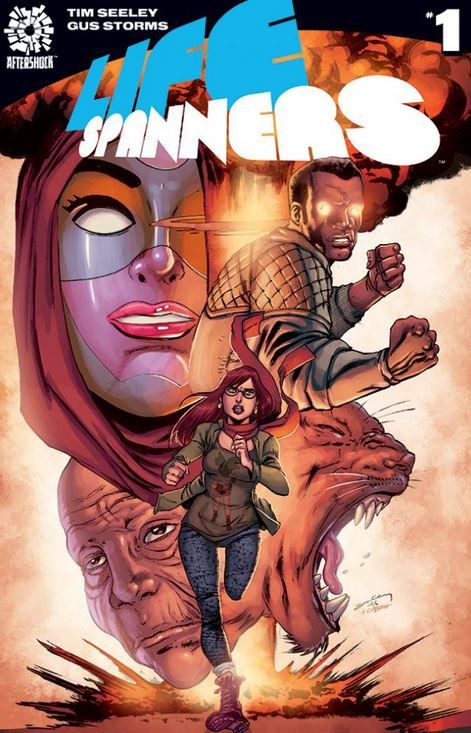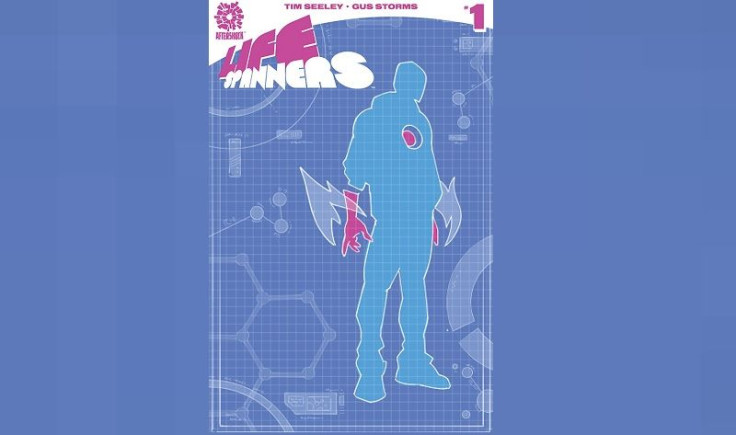AfterShock Comics launched in April 2015, giving comic book creators another outlet to tell new and exciting stories. And since its creation, AfterShock has accumulated some of the giants of the comic book industry, and writer Tim Seeley is another name on the list. The creator of Hack/Slash and Revival partners with Gus Storms (EGOs, Legion of Super-Heroes) to bring Lifespanners (which releases July 13) to AfterShock, telling a story about how superpowers are created and sold to the public at the highest cost…their physical well-being.
But there’s a lot more to the story and world of Lifespanners than purchasing superpowers, and it’s up to one reluctant reporter to uncover the truth.
iDigitalTimes spoke with Seeley about his new project and how his story reflects the medtech industry while also finding room to poke fun at the current state of journalism.
iDigitalTimes: I’ve read the solicit and synopsis of the first issue of Lifespanners but can you describe the world and the book in general?
Tim Seeley: “It’s a story that takes place not too far in the future in a world where people are constantly trying to improve themselves, and a woman develops a method of giving people superpowers but the superpowers kill you. The more powerful you are the shorter you live.
“This reporter is given this information and she’s pursued by various companies who have interest in this sort of thing. It’s sort of political intrigue, with some science fiction and some superhero stuff and combining a whole bunch of things that are relevant and of the moment in our own world. So I get to do a lot of cool stuff with it.”
It seems like the woman you’re describing is the main character. Can you go into who she is?
“The main character is a reporter named Kennedy Avis and she is a reporter for a Buzzfeed-type [outlet] where in the future news has been reduced to a top ten list or a quick soundbite that can be written. So she’s not really a journalist and she doesn’t really care. She’s totally fine just writing a ‘Top Ten Ways to Lose Weight While You’re Having Sex’ thing.
“And suddenly she’s given this story, that’s the biggest story in history, and she has to figure out how to be a real reporter and also survive in [Lifespanners].”
It sounds like you're writing a story on the current state of journalism.
“Sure, I’ve taken a lot of journalism courses in college and I'm always surprised with what audiences prefer in their journalism now versus what I think counts as actual journalism. So yeah, I kind of wanted to take a poke at that future, in the near future where there’s always these horrors going on in the world and people are more interested in top 10 lists and celebrity news.”
How does Kennedy take having this story thrust upon her? Is she gung-ho about it or does she want to hand it off to someone else?
“That’s kind of the twist of the story, she can’t hand it out. The story is written in her DNA. She’s basically learning the story. They use a sort of imprinting device about what happened in her DNA. She’s actually the story, literally.
“So she’s on the run from a lot of people who want to extract the news and information from her. So yea, it’s kind of a way where she has no choice but to try and get the story out to the world or it will kill her.”
Just to clarify, is that how the news is gathered in this world or is it just for this particular story?
“Just for this story. The woman who creates this, there’s this Chinese scientist who creates a variety of crazy tech and she develops this DNA information coding and that’s how it gets into our character.”
You’ve described the main character, but is there a larger cast?
“There’s another character named Jim Heller who works for the company that is trying to basically ‘own the process.’ And he’s sort of like a Superman-type that works for a pharmaceutical/medtech company, and his job is to get Kennedy back, but every time he uses his powers he’s losing years off his life. So he’s trying to conserve his powers but he’s basically a god if he wants to be, but it will kill him.”
Is there a character that was your favorite to write? Is it Kennedy?
“She’s probably my favorite but...I like them all. When you create characters you look for something to connect to, and for Kennedy she just really wants to avoid trouble. She’s so comfortable with the world as it is, which I can relate to. And Heller, he’s the guy who is ‘duty first’ and he’s given his life, literally, to do his job. I like those two a lot.
“There’s some characters in the second issue that are bunch of like early-adopter, type kids who are super into body modification and they have some really creepy superpowers and they were a lot of fun to write too….I kind of liken them to people who get out of college and start tech companies right away. That’s these guys, but they are doing this with superpowers. They have their own methods of giving themselves superpowers but their technology is a little janky and they are trying to get better stuff all the time.
“They want to make their mark and are full of energy. It’s a parallel to one of the things we talk about in the story, life after college there’s no jobs. They’re sort of like millennials today, so they go and activate their own [powers] and they happen to give themselves super strength or the head of a lion on their body. They do crazy stuff like that to make their mark.”

How did Gus Storm come onboard and how was it working with him?
“Gus was pitched by Mike Marts [Editor-in-Chief, Co-founder of AfterShock Comics], which I totally agreed with. He’s done a lot of sci-fi stuff before, he’s done a book called EGOs for Image Comics and he also did a Legion of Super-Heroes story and he’s really good at science fiction. He has this clean style that sort of makes everything look what I expect future technology to look like, very clean and organic. He was the perfect choice for it.
“He liked the idea so we got put together and I did a few designs for him and just let him go crazy.
“I’ll generally give rough descriptions and ideas to my artist but I let them do what they want because they have to live drawing this stuff. So yeah, I let Gus do a lot of the designs, I give suggestions and kind of scratch stuff but a lot of it is I want him to do his own thing.”
Is Lifespanners always a story you wanted to tell or was it a relatively recent story you came up with?
“It was kind of a combination. It was an idea that me and my brother have been talking about. I go to my brother’s a lot and toss back ideas and this is one we came up with. And then I got inspired to pick it back up on a plane trip to California and I ended up sitting next to a guy in the medtech industry. And he was telling me all these horror stories about the way medical technology is created and how it’s one of the most competitive industries and big companies literally steal inventions from smaller companies because it’s easier to just pay a fine than to invent something new.
“It’s really interesting and this sort of idea that all these things that are designed to make our lives better and help people are actually a big business and very cutthroat and run by corporations. I thought that was a great inspiration to start from with this story.”
You’ve written for DC Comics and written established characters before; you’ve also created your own characters and worlds with Hack/Slash and Revival. Do you enjoy creating your own worlds?
“That’s probably the best part of writing comics, the initial phase of making stuff up is the most fun. Where the sky's the limit and you’re building a world and populating it with people who live there, that’s the most fun. And then getting to write the story, that’s the hard part. That’s where you have to make everything connect and you have to really sit down and think. But the pure creation of an original property is a real blast.”
I always find [the creative process] fascinating: there’s no pressure with original work, right? You don’t have to get a character right that’s been around for decades, this is your character. Is there less pressure to write them?
“I think there’s a little more pressure, honestly. You have to set up the rules and then break them. If you’re doing an existing property the rules are already there, so it’s a little more complex and takes a lot more time. But the rewards can be great.”
And how would you pitch Lifespanners to readers so they can check out?
“I’m a writer not an advertising guy [laughs]. But we are in a time of comics where you can really tell some really smart and intelligent stuff ahead of the curve because we can do it so quickly and make comics much quicker than movies. I think if you want to read something that pulls from the headlines and will make you think about some things you’ll definitely want to read this book.
“In the meantime, you’ll get to see a lady getting chased by weird kids with strange superheroes like having a lion head glued to their face.”


















